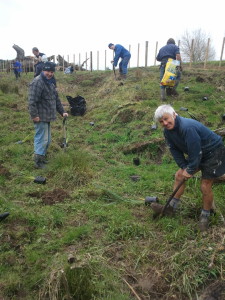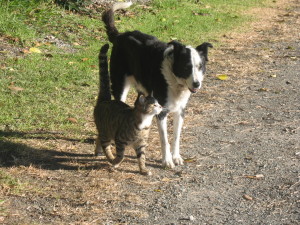Otamatea HarbourCare members – the farmer front left – getting stuck in planting natives to improve water quality in the Kaipara Harbour.
Each morning I’m a picture of sartorial style in muddy overalls, beanie and gumboots as the farmer and I move cattle. Up until the big wet we moved young bulls in the intensive grazing system every two days, but now they’re in smaller paddocks. In larger areas they stomp the lot to muck by the end of day one and stage a mutinous break-out in day two.
As it was, there were break outs because the electric fence system took a hammering in the storm. But that’s a tiny glitch compared to what many farmers are facing, plus I’ve found returning Houdini cattle to their paddocks to be surprisingly satisfying.
My dog Floss and I sometimes walk several hundred metres to bring back escapees. One lot spotted me as I approached and came running at a gallop, like naughty schoolboys who’d been caught out. There’s always one laggard and as we plodded to get him, I expressed this to Floss in strong farmer language. The big wet does tend to inspire a colourful vocabulary, even among lucky ones like us.
The farmer calculated that at flood’s peak, only about one percent of the farm was under water. Some farmers have 90 percent of their land swamped. That morning Floss and I did face a sludgy battle of wills, but the bulls eventually galloped into a valley and up the other side and were soon with their mates. I was thrilled.
Then, last Saturday, cattle moving done, the farmer and I picked up spades and headed off to plant native trees. I also find it surprising satisfying to head off the farm clad in muddy overalls and gumboots and not give, as my dog Floss would say, a dog’s biscuit what I look like.
It was my second planting of the week and the farmer’s third. With the manager and helpers, he’d planted about 1200 natives on the edge of the farm, then he and I dug up flaxes that had taken root in his mother’s garden. After separating the big ones, we planted about 70 between the coastal fence and harbour.
“They don’t go far,” observed the farmer after we were done.
On Saturday we attended the inaugural planting day of the fledgling Otamatea HarbourCare group which has the slogan, ‘Productive land with a healthy harbour’.The team put in about 750 flaxes, cabbage trees and manuka by a waterway on a farm that borders State Highway 12. It will be a living advertisement for the group and the massive and long-term effort required to plant the edge of the Kaipara Harbour to reduce run-off and increase water quality.
Afterwards we gathered in a farm shed. As lunch came to an end, it was time for a speech acknowledging the momentous occasion. Mark Vincent, who’s taken on the task of getting the group going, drew inspiration from Winston Churchill: “Now this is not the end. It is not even the beginning of the end. But it is, perhaps, the end of the beginning.”
If spending a weekend morning in mud and gumboots (overalls optional) and leaving a legacy of coastal plants appeals, you can find out about future planting days by emailing mark.cindy.vincent @ gmail.com (remove the spaces which are there to prevent spam).
]]>Floss, a vet’s dream (broken leg, infected foot, devoured a chocolate cake, spayed) being smooched by Cheetah, a budget cat so far, neutered with a quick snip – fingers crossed he’ll keep well and safe.
If you surrendered to a loved one who wanted a pet for Christmas it’s not too late to supplement your gift. Yep – I’m talking money. When animals break or get sick they need to be repaired unlike other gifts which can be returned or trashed.
Animals are for life – or that’s the idea – although I do know of two dogs and a cat that went to new homes when their owners couldn’t cope.
Over the years, some of our pets have notched up big veterinary bills.
Lilac had hyperthyroidism (she went to heaven in May). The symptoms were odd – she stopped hissing at the dogs, was no longer hostile to the cats. When picked up, she’d unfailingly slump, purring, on anyone’s shoulder. She’d always thrown up hair balls, but not food, and her fur seemed sticky, like she’d been in paspalum.
The clever vet’s guess was confirmed by a blood test. Lilac gobbled tablets for the rest of her days – we chose not to shell out $600 for radiation treatment – but regular blood tests meant regular outgoings.
Tara the cat’s decaying teeth made her breath smell like a Chernobyl drain – until a vet did dental work. Dot the cat is allergic to fleas – and perhaps something else, still undefined – while miniscule mites gnaw Floss’s skin (dogs are even more costly than cats) unless I use a special flea and mite killer.
The ills of the farmer’s dog Mo (now deceased) sent her to four-figure vet bill class. She had a growth removed from a mammary gland and snapped something in her leg that required surgery. Kate still suffers occasional pain following a hip op after she got run over, while Floss got skittled as a puppy, had an infected foot and scoffed too much chocolate cake. Chocolate can kill dogs, and the cocoa in cakes delivers a vicious punch. The loss of the cake paled in comparison to the cost of the Sunday treatment to make Floss puke.
So if you gave a pet for Christmas perhaps you could add a savings account. And if you got given an animal, it might be wise to drop hints about its running costs.
Happy 2014 and a big, warm thank you for reading my blog.
]]>The suspected lamb whose bloody birth was seen by a passerby who assumed the sheep had ‘sprung a bearing’.
Spring has sprung, the grass has ris’, daffodils are blooming and lambs have bloomin’ popped out everywhere.
But unfortunately it’s not always a lamb that pops out but what farmers call a ring or bearing. In fact, it’s a prolapsed vagina.
The farmer reckons about three of his sheep a year suffer this misfortune which, generally, can happen just prior to lambing, often if a sheep is fat, has a full rumen, a full bladder and the lambs are about grown. The sheep’s internal accommodation is packed to the max – then some. Pop!
The Ministry of Primary Industries begins its webpage on the subject, thus: “Bearings (prolapses of the vagina) in ewes can be a problem every year as lambing approaches, even on the best-managed farms.”
There’s a delicate balance – insufficient feed in the weeks before to lambing can also be a culprit. Scanning can determine which sheep are expecting multiple lambs and need more food – but not too much.
In basic terms, the solutions for a prolapse are: clean it, let the bladder empty, shove everything back inside the sheep and hope it stays there – or euthanasia.
In the two cases I’ve seen the vagina didn’t stay put, despite the use of a special contraption and both had to be killed.
Case number on was a pregnant ewe and case two was Ashley, a too-fat former pet lamb. I made very sure no bits of little Ashley ended up in our freezer.
The worker’s grand-daughter had named her two pet lambs after the Olsen twins. After weaning, Mary-Kate joined the flock while Ashley hung around our garden gate and scoffed.
Last week at nine pm, the farmer took a call from someone who’d driven past earlier that day. She said she’d seen a sheep with its ring out, had left a note in our letterbox and asked whether the situation had been handled.
The caller was off a farm, she said, and she and her friends were appalled. Plus, she insisted, she saw the farmer drive past the suffering sheep without stopping, and she’d be in touch with the newspaper and SPCA if the sheep wasn’t taken care of.
As I said in Love at the End of the Road, farming is a high-vis business, and it’s Murphy’s Law that the day an animal dies/gets caught in a fence/breaks a leg/springs a ring is the day you’re off the farm or busy elsewhere.
The caller got so worked up, the farmer found no air time in which to say he wasn’t driving the ute she’d seen. The wife of a former farm worker who’d been to visit was at the wheel, and other visiting farmers hadn’t spotted the troubled sheep either.
The farmer’s next question, after the indignant caller hung up on him, was to me. Had I seen the note she’d left, given I’d just cleared the mailbox – after dark and during a TV commercial break?
Nope, sorry. As I love after-dark missions, we headed off with headlamps to see if we could spot the sheep and check the other farm mail boxes. We failed on all counts.
The farmer and farm manager scored another epic fail the next morning. But while they didn’t find a suffering sheep, a ewe with newborn lambs was in about the spot of the perceived crime. It had been a bloody birth and the ewe was still trailing the ripped amniotic sac.
The farmer concluded the appalled group might have seen a ewe giving birth – when the placenta appears first it can look like a prolapse.
Farmers appreciate passersby who take the time to report problems – when they’re kind, well mannered and don’t jump to conclusions or act like know-it-alls – even if they’re right.
I can confirm living on a farm doesn’t qualify anyone to be a farmer. Once while driving from the farm, I was politeness itself when I phoned the farmer to report a suspected dead bull. There it was, lying on its side and still as a rock with birds hopping about on its bulbous tummy. When the farmer checked it out soon afterwards it was standing up and eating grass.
]]>


